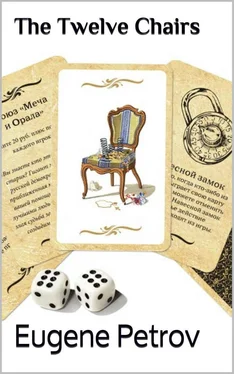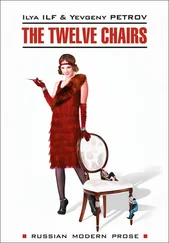Eugene Petrov - The Twelve Chairs
Здесь есть возможность читать онлайн «Eugene Petrov - The Twelve Chairs» весь текст электронной книги совершенно бесплатно (целиком полную версию без сокращений). В некоторых случаях можно слушать аудио, скачать через торрент в формате fb2 и присутствует краткое содержание. Год выпуска: 2013, Жанр: Юмористическая проза, на английском языке. Описание произведения, (предисловие) а так же отзывы посетителей доступны на портале библиотеки ЛибКат.
- Название:The Twelve Chairs
- Автор:
- Жанр:
- Год:2013
- ISBN:нет данных
- Рейтинг книги:5 / 5. Голосов: 1
-
Избранное:Добавить в избранное
- Отзывы:
-
Ваша оценка:
- 100
- 1
- 2
- 3
- 4
- 5
The Twelve Chairs: краткое содержание, описание и аннотация
Предлагаем к чтению аннотацию, описание, краткое содержание или предисловие (зависит от того, что написал сам автор книги «The Twelve Chairs»). Если вы не нашли необходимую информацию о книге — напишите в комментариях, мы постараемся отыскать её.
Find traces of a separate headset difficult and heroes face different adventures and troubles.
The Twelve Chairs — читать онлайн бесплатно полную книгу (весь текст) целиком
Ниже представлен текст книги, разбитый по страницам. Система сохранения места последней прочитанной страницы, позволяет с удобством читать онлайн бесплатно книгу «The Twelve Chairs», без необходимости каждый раз заново искать на чём Вы остановились. Поставьте закладку, и сможете в любой момент перейти на страницу, на которой закончили чтение.
Интервал:
Закладка:
meals prepared in pure butter. The advertisement began "Cheap and Good!" His
wife filled an enamel dish with flour-and-water paste, and late one evening
the holy father went around sticking the advertisements on all the telegraph
poles, and also in the vicinity of state-owned institutions.
The new idea was a great success. Seven people appeared the first day,
among them Bendin, the military-commissariat clerk, by whose endeavour the
town's oldest monument-a triumphal arch, dating from the time of the Empress
Elizabeth-had been pulled down shortly before on the ground that it
interfered with the traffic. The dinners were very popular. The next day
there were fourteen customers. There was hardly enough time to skin the
rabbits. For a whole week things went swimmingly and Father Theodore even
considered starting up a small fur-trading business, without a car, when
something quite unforeseen took place.
The Hammer and Plough co-operative, which had been shut for three weeks
for stock-taking, reopened, and some of the counter hands, panting with the
effort, rolled a barrel of rotten cabbage into the yard shared by Father
Theodore, and dumped the contents into the cesspool. Attracted by the
piquant smell, the rabbits hastened to the cesspool, and the next morning an
epidemic broke out among the gentle rodents. It only raged for three hours,
but during that time it finished off two hundred and forty adult rabbits and
an uncountable number of offspring.
The shocked priest had been depressed for two whole months, and it was
only now, returning from Vorobyaninov's house and to his wife's surprise,
locking himself in the bedroom, that he regained his spirits. There was
every indication that Father Theodore had been captivated by some new idea.
Catherine knocked on the bedroom door with her knuckle. There was no
reply, but the chanting grew louder. A moment later the door opened slightly
and through the crack appeared Father Theodore's face, brightened by a
maidenly flush.
"Let me have a pair of scissors quickly, Mother," snapped Father
Theodore.
"But what about your supper? "
"Yes, later on."
Father Theodore grabbed the scissors, locked the door again, and went
over to a mirror hanging on the wall in a black scratched frame.
Beside the mirror was an ancient folk-painting, entitled "The Parable
of the Sinner", made from a copperplate and neatly hand-painted. The parable
had been a great consolation to Vostrikov after the misfortune with the
rabbits. The picture clearly showed the transient nature of earthly things.
The top row was composed of four drawings with meaningful and consolatory
captions in Church Slavonic: Shem saith a prayer, Ham soweth wheat, Japheth
enjoyeth power, Death overtaketh all. The figure of Death carried a scythe
and a winged hour-glass and looked as if made of artificial limbs and
orthopaedic appliances; he was standing on deserted hilly ground with his
legs wide apart, and his general appearance made it clear that the fiasco
with the rabbits was a mere trifle.
At this moment Father Theodore preferred "Japheth enjoyeth power". The
drawing showed a fat, opulent man with a beard sitting on a throne in a
small room.
Father Theodore smiled and, looking closely at himself in the mirror,
began snipping at his fine beard. The scissors clicked, the hairs fell to
the floor, and five minutes later Father Theodore knew he was absolutely no
good at beard-clipping. His beard was all askew; it looked unbecoming and
even suspicious.
Fiddling about for a while longer, Father Theodore became highly
irritated, called his wife, and, handing her the scissors, said peevishly:
"You can help me, Mother. I can't do anything with these rotten hairs."
His wife threw up her hands in astonishment.
"What have you done to yourself?" she finally managed to say.
"I haven't done anything. I'm trimming my beard. It seems to have gone
askew just here. . . ."
"Heavens!" said his wife, attacking his curls. "Surely you're not
joining the Renovators, Theo dear?"
Father Theodore was delighted that the conversation had taken this
turn.
"And why shouldn't I join the Renovators, Mother? They're human-beings,
aren't they?"
"Of course they're human-beings," conceded his wife venomously, "but
they go to the cinema and pay alimony."
"Well, then, I'll go to the cinema as well."
"Go on then!"
•Twill!"
"You'll get tired of it. Just look at yourself in the mirror."
And indeed, a lively black-eyed countenance with a short, odd-looking
beard and an absurdly long moustache peered out of the mirror at Father
Theodore. They trimmed down the moustache to the right proportions.
What happened next amazed Mother still more. Father Theodore declared
that he had to go off on a business trip that very evening, and asked his
wife to go round to her brother, the baker, and borrow his fur-collared coat
and duck-billed cap for a week.
"I won't go," said his wife and began weeping.
Father Theodore walked up and down the room for half an hour,
frightening his wife by the change in his expression and telling her all
sorts of rubbish. Mother could understand only one thing-for no apparent
reason Father Theodore had cut his hair, intended to go off somewhere in a
ridiculous cap, and was leaving her for good.
"I'm not leaving you," he kept saying. "I'm not. I'll be back in a
week. A man can have a job to do, after all. Can he or can't he?"
"No, he can't," said his wife.
Father Theodore even had to strike the table with his fist, although he
was normally a mild person in his treatment of his near ones. He did so
cautiously, since he had never done it before, and, greatly alarmed, his
wife threw a kerchief around her head and ran to fetch the civilian clothing
from her brother.
Left alone, Father Theodore thought for a moment, muttered, "It's no
joke for women, either," and pulled out a small tin trunk from under the
bed. This type of trunk is mostly found among Red Army soldiers. It is
usually lined with striped paper, on top of which is a picture of Budyonny,
or the lid of a Bathing Beach cigarette box depicting three lovelies on the
pebbly shore at Batumi. The Vostrikovs' trunk was also lined with
photographs, but, to Father Theodore's annoyance, they were not of Budyonny
or Batumi beauties. His wife had covered the inside of the trunk with
photographs cut out of the magazine Chronicle of the 1914 War. They included
"The Capture of Peremyshl", "The Distribution of Comforts to Other Ranks in
the Trenches", and all sorts of other things.
Removing the books that were lying at the top (a set of the Russian
Pilgrim for 1913; a fat tome, History of the Schism, and a brochure entitled
A Russian in Italy, the cover of which showed a smoking Vesuvius), Father
Theodore reached down into the very bottom of the trunk and drew out an old
shabby hat belonging to his wife. Wincing at the smell of moth-balls which
suddenly assailed him from the trunk, he tore apart the lace and trimmings
and took from the hat a heavy sausage-shaped object wrapped in linen. The
sausage-shaped object contained twenty ten-rouble gold coins, all that was
left of Father Theodore's business ventures.
With a habitual movement of the hand, he lifted his cassock and stuffed
the sausage into the pocket of his striped trousers. He then went over to
the chest of drawers and took twenty roubles in three- and five-rouble notes
Читать дальшеИнтервал:
Закладка:
Похожие книги на «The Twelve Chairs»
Представляем Вашему вниманию похожие книги на «The Twelve Chairs» списком для выбора. Мы отобрали схожую по названию и смыслу литературу в надежде предоставить читателям больше вариантов отыскать новые, интересные, ещё непрочитанные произведения.
Обсуждение, отзывы о книге «The Twelve Chairs» и просто собственные мнения читателей. Оставьте ваши комментарии, напишите, что Вы думаете о произведении, его смысле или главных героях. Укажите что конкретно понравилось, а что нет, и почему Вы так считаете.












